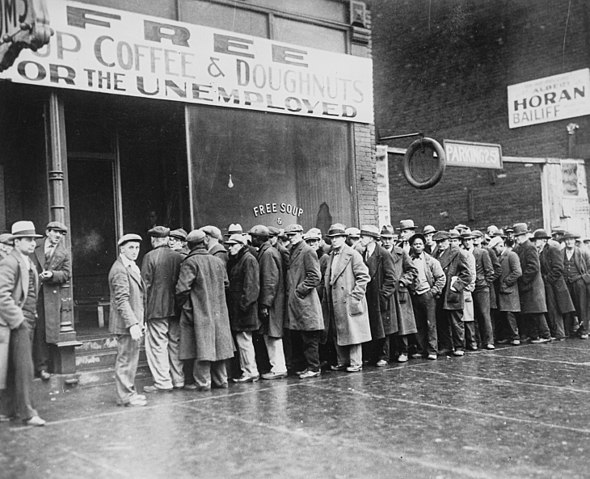
The tsunami has struck:
Another 4.4 million Americans filed for initial jobless claims last week, revealing that at least 26 million people have requested unemployment benefits since the outbreak of the coronavirus pandemic.
In just one month, all job gains since the Great Recession have disappeared, according to new data released Thursday by the Department of Labor.
As of April, the official U.S. unemployment rate skyrocketed to nearly 15%. This shatters the previous high-water mark of 10% set in October 2009 and, as noted, is the equivalent of destroying every job that’s been created in the eleven years since then.
But even this staggering number is an underestimate, because it only counts those who are actively looking for work. It doesn’t count those who’ve given up, those who are working part-time and want full-time work but can’t get it, or those who are furloughed and are waiting to find out if they’ll return to their jobs. As Treasury Secretary Steven Mnuchin acknowledged, the true number may be closer to 25%, which would tie the all-time high set in the depths of the Great Depression.
It’s just barely possible there will be a rapid (“V-shaped”) recovery, since, unlike previous recessions, the cause is strictly external to the economy. There are no bank collapses or bursting bubbles that make people not want to spend. In theory, as soon as the lockdowns lift, the economy could roar back to life.
But that’s only true if the lockdowns are over soon, and that seems unlikely. A ruinously incompetent federal government and an erratic patchwork of state responses have given the virus ample opportunity to spread. It’s more probable that states will reopen their economies, new cases will spike, and they’ll have to backpedal. The longer this drags on, the more businesses that are currently on life support will begin to fail, and those temporary layoffs will become permanent. People will have to use up their savings just to support themselves, with no capability to earn more.
Besides, the economic freeze hasn’t been solely imposed from above. As this article points out, restaurant traffic collapsed before shutdown mandates came into force, and industries that are still open right now, like airlines and hotels, have seen traffic plummet to nearly zero. People are fearful, rightfully so, and they’re not going to patronize businesses where they think they might get sick even if those businesses are officially “reopened”.
The coronavirus is also hammering industries that supply consumer goods, like meatpacking plants, where a mostly immigrant workforce labors in crowded conditions. Some of the largest slaughterhouses in the country have been forced to shut down by outbreaks, and that disruption ripples through the supply chain. The industry operates with such tight margins that if farmers can’t have their animals butchered exactly when they planned, it’s cheaper to euthanize them and dump their bodies in mass graves than to keep feeding them for a few extra weeks. The resulting shortages are so severe that fast food chains like Wendy’s are running out of beef. (Is it wrong to think that Americans getting mad because they can’t buy meat is going to damage Trump’s reelection chances more than anything else to come out of this pandemic?)
Much the same way, farmers across the country are letting crops rot in the fields and dumping milk into the sewers – even as people go hungry and demand soars at food banks – because they’re specialized to supply restaurants, catering halls, theme parks and other large businesses that currently don’t have any customers, and those supply lines can’t be retooled in time for the harvest.
It’s very likely that the pandemic would have hit our shores no matter who was president, but there’s no reason the economic impact had to be this devastating. In Europe and Canada, governments are paying the salaries of people who can’t work. (And of course, in countries with universal health care that isn’t tied to employment, even people who are out of work can see a doctor if they need to.)
America’s version of this, the Paycheck Protection Program, ran out of money almost immediately, and Senate Republicans have balked at pumping in more. State unemployment systems are meant to take up the slack, but they too have been hammered by a flood of claims. The Senate Republican response has been pure let-them-eat-cake dismissiveness. They say they won’t support further relief unless businesses are immunized against lawsuits for making their employees sick, and they’ve suggested that states should file bankruptcy rather than seek federal help to support the unemployed. Meanwhile, Trump has just gotten bored with the crisis. He wants to dissolve the coronavirus task force and push states to reopen, ready or not.
The GOP’s top priority is forcing people back to work, regardless of the raging pandemic. They seem worried that if they offer anything more than the bare grudging minimum of help, people will start wondering why the government can’t ensure that sick people get health care and that unemployed people don’t starve or lose their homes all the time, not just in the midst of a global emergency. Socialism is an attractive notion when the economy is collapsing, and they’re determined to stamp out those embers of compassion, no matter how much cruelty is necessary to do it.
And it has to be said: If democracy is the expression of the will of the people, then America chose this. We chose this when we elected a preening sociopath whose only talent is blaming others for his own failures. We chose this when we elected Republicans whose attitude is to bail out the rich and let the poor die. It’s as if the passengers on the Titanic voted to throw away their lifeboats and steer directly into the iceberg.
Image credit: Wikimedia Commons